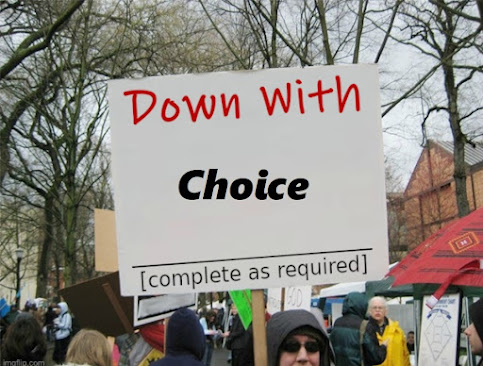Down With... Choice
Before we go any further, let me say that no, this week's film is not about abortion.
It is however very much about choice. The abortion rights movement have championed the idea of "choice" because they have chosen (see what I did there?) to frame the battle as one of personal freedom. Also because their opponents would otherwise try to label them "anti-life", which doesn't look so good on a placard.
But the dirty little secret of the abortion battle is that everyone is pro-choice. The argument is not about choice; it's about who gets to make that choice. In some communities, the choice is left to the individual, while in other communities, the choice is made by the State.
Everybody wants to choose. Some people also want to choose for others.
Choice is very much the issue at hand in our next film, which takes place in North London's ultra-Orthodox Jewish community.
Disobedience, based on Naomi Alderman's 2006 novel, tells the story of Ronit Krushka, a young woman who was compelled to leave the orthodox community of her childhood, only to find herself returning when word reaches her of the death of her father.
Her unexpected return is not exactly celebrated by the rest of the community, as is often the case in situations where someone has been shunned for a perceived transgression.
Homosexuality is no longer illegal, and people who find themselves in comparable situations today have options (and rights) that the characters in Victim did not have. These changes did not happen all by themselves, of course. Generations of would-be Victims fought long and hard to secure those rights for their descendants.
The characters of Disobedience may choose (there's that word again) to exercise those rights (rights which were hard-won) or they can accept their role as victims. That is also a choice.
Sometimes Cancel Culture can be incredibly destructive and oppressive. I don't think anyone ever chooses to be burned as a Witch, for example, or lynched.
But our society no longer burns Witches. If you choose to remain in a community that believes you should be burned as a witch, it might mean that somewhere, deep down, you believe that witches deserve to be burned.
Of course the reverse of that is also true. You can choose not to be burned as a Witch.
Sometimes Cancel Culture requires consent.
We will be screening Disobedience at 7.30pm on Thursday, the 25th of May, at the Victoria Park Baptist Church.











Comments
Post a Comment